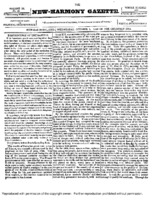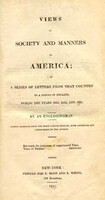Frances “Fanny” Wright in her Own Words
In other countries it may seem of little consequence to inculcate upon the female mind “the principles of government and the obligations of patriotism” but it was wisely foreseen by that venerable apostle of liberty that in a country where a mother is charged with the formation of an infant mind that is to be called in future to judge of the laws and support the liberties of a republic, the mother herself should well understand those laws and estimate those liberties. Personal accomplishments and the more ornamental branches of knowledge should certainly in America be made subordinate to solid information…
I must remark that in no particular is the liberal philosophy of the Americans more honorably evinced than in the place which is awarded to women. The prejudices still to be found in Europe, though now indeed somewhat antiquated, which would confine the female library to romances, poetry, and belles letters, and female conversation to the last new publication, new bonnet, and pas seul, are entirely unknown here. The women are assuming their place as thinking beings, not in despite of the men, but chiefly in consequence of their enlarged views and exertions as fathers and legislators…
It strikes me that it would be impossible for women to stand in higher estimation than they do here. The deference that is paid to them all at times and in all places has often occasioned me as much surprise as pleasure…
Perhaps the condition of women affords, in all countries, the best criterion by which to judge of the character of men. Where we find the weaker sex burdened with hard labour, we may ascribe to the stronger something of the savage, and where we see the former deprived of free agency, we shall find in the latter much of the sensualist. I know not a circumstance which more clearly marks in England the retrograde movement of the national morals than the shackles now forged for the rising generation of women. Perhaps these are as yet more exclusively laid upon what are termed the highest class, but I apprehend that thousands of our countrywomen in the middle ranks, whose mothers, or certainly whose grandmothers, could ride unattended from the land’s end to the border and walk abroad alone or with an unmarried friend of the other sex armed with all the unsuspecting virtue of Eve before her fall –
I apprehend that the children and grandchildren of these matrons are now condemned to walk ni leading strings from the cradle to the altar, if not to the grave, taught to see in the other sex a race of seducers rather than protectors and of masters rather than companions. Alas for the morals of a country when female dignity is confounded with helplessness and the guardianship of a woman’s virtue transferred from herself to others! If any should doubt the effect produced by the infringement of female liberty upon the female mind, let them consider the dress of the present generation of English women. This will sufficiently settle the question without a reference to the pages of the daily journals. Of the two extremes it is better to see a woman, as in Scotland, bent over the glebe, mingling the sweat of her brown with that of her churlish husband or more churlish son, than to see her gradually sinking into the childish dependence of a Spanish donna…
In America much certainly is done to ameliorate the condition of women, and as their education shall become, more and more, the concern of the state, their character may aspire in each succeeding generation to a higher standard. The republic, I am persuaded, will be amply repaid for any trouble or expense that may be thus bestowed. In her struggles for liberty much of her virtue emanated from the wives and daughters of her senators and soldiers, and to preserve to her sons the energy of freemen and patriots she must strengthen that energy in her daughters…
Now, though it is by no means requisite that the American women should emulate the men in the pursuit of the whale, the felling of the forest, or the shooting of wild turkeys, they might, with advantage, be taught in early youth to excel in the race, to hit a mark, to swim, and in short to use every exercise which could impart vigor to their frames and independence to their minds.[1]
[1] These passages, written by Wright after her first visit and tour of America show her belief that American women were being treated differently than their European counterparts. She clearly explains her beliefs in women’s ability for equality and hopes for the future of women. Perhaps her belief in the progressiveness of the treatment of American women explains why she chose America as the site for her attempts at changing society towards her more utopian idealism. Wright, Views of Society and Manners in America, 219–22.
Fanny Wright envisioned a world of true equality. In her public lectures and her writings, she consistently railed against the subordination and inequality of women. Her biographer Celia Morris Eckhardt wrote that she was the “first to argue that women were men’s equals and must be granted an equal role in all the business of public life.”[1] At times she even argued that in her role as a female activist, she could lay claim to an even stronger capacity for such action. In one of her lectures, she asked “Shall I appear additionally presumptuous for believing that my sex and my situation tend rather to qualify than to incapacitate me for the undertaking?”[2] She felt that men and women should not remain as two halves of the same whole. She maintained that women should be an individual unto themselves. “The two persons in human kind – man and woman – shall exert equal influences in a state of equal dependence.”[3]
Within this autonomy, Wright saw marriage and child rearing as a detriment to the individualism and freedom of women. She felt that marriage was particularly confining and only served to subjugate women further. “Married without knowing anything of life but its amusements, and then quickly immersed in household affairs and the rearing of children, they command but few of those opportunities by which their husbands are daily improving in sound sense and varied information.”[4] She often argued against the restrictions against divorce which precluded many women from even being able to seek out a divorce to escape a bad marriage. “Alas for the morals of a country when female dignity is confounded with helplessness and the guardianship of a woman’s virtue transferred from herself to others!”[5]
Wright’s solution to the ills of society was education and reason-based knowledge. This knowledge was to exclude even religion. She saw religion as unsound and designed to lead thinking minds astray from reasonable thought. “By exercising the senses, faculties, and feelings, which appertain to our nature; and, instead of submitting our reason to the authority of fallible books and fallible teachers, by bringing always the words of all books and all teachers to the test of our reason.”[6] She believed that education should be both universal and egalitarian. She envisioned a world where children would be raised together, male and female, “fed at a common board; clothed in a common garb, uniting neatness with simplicity and convenience; raised in the same exercise of common duties, in the acquirement of the same knowledge and practice of the same industry, varied only according to individual taste and capabilities.”[7] She believed such practices would create children who would, “when arrived at manhood and womanhood, work out the reform of society – perfect the free institutions of America.”[8] Her life’s work was to continually pursue this vision of her perfect, equal, and well-educated society.
[1] Eckhardt, Fanny Wright : Rebel in America, 1.
[2] Wright, Course of Popular Lectures as Delivered by Frances Wright with Three Addresses on Various Public Occasions, and a Reply to the Charges against the French Reformers of 1789. Second Edition, 33.
[3] D’arusmont, England, the Civilizer, 22.
[4] Wright, Views of Society and Manners in America, 22.
[5] Wright, 219.
[6] Wright, Reason, Religion, and Morals, 146.
[7] Wright, Course of Popular Lectures as Delivered by Frances Wright with Three Addresses on Various Public Occasions, and a Reply to the Charges against the French Reformers of 1789. Second Edition, 169.
[8] Wright, 169.

New-Harmony Gazette front page
An issue of the New-Harmony Gazette, the newspaper Fanny Wright co-edited and co-authored with her friend Robert Dale Owen.
